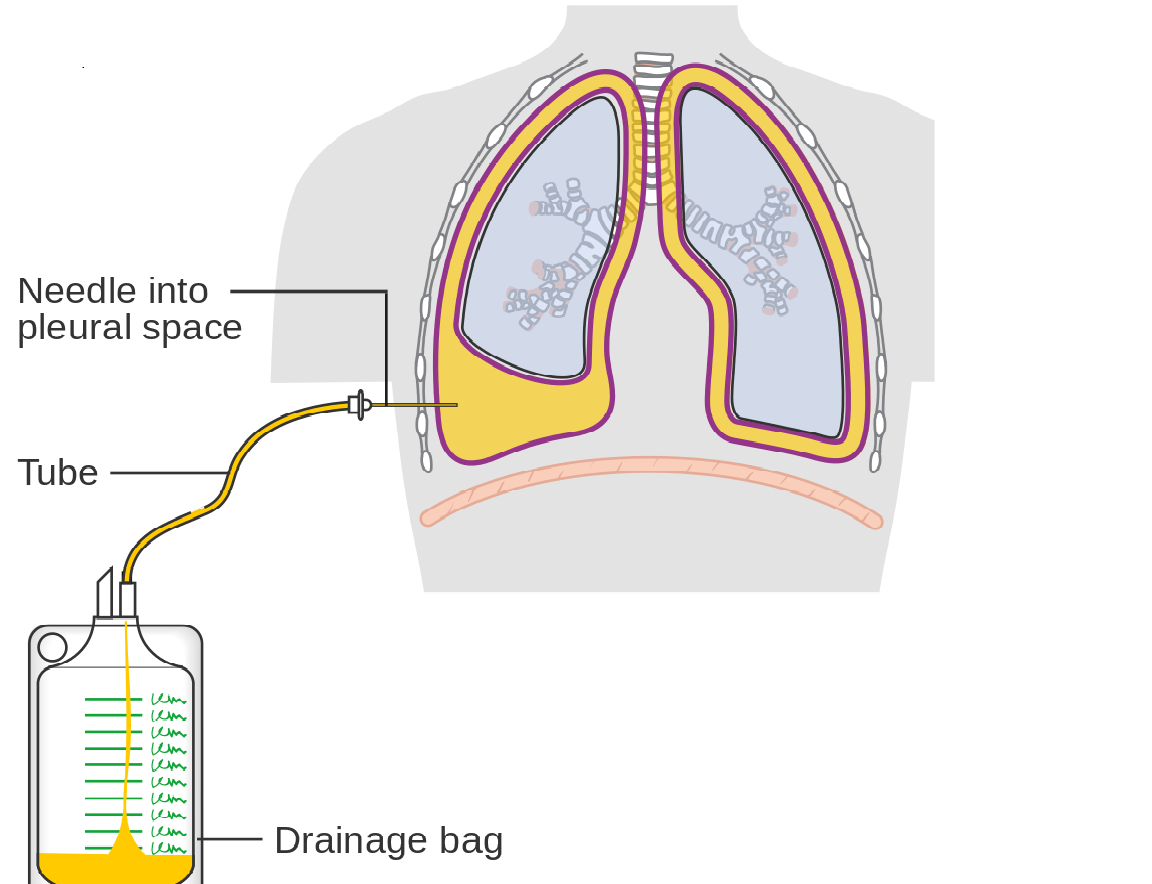

Patients with malignant (cancerous) pleural effusions (buildup of excess fluid in the pleural space, the space between the visceral and parietal lining of the lung) have significant shortness of breath, cough, chest pain and shortened life expectancy.
Indwelling pleural catheters (IPC) allow patients to drain pleural fluid at home and can lead to “autopleurodesis” (spontaneous cessation of pleural drainage without the use of other invasive procedures). Pleurodesis is a medical procedure in which the pleural space is artificially obliterated, involving the adhesion of the two lung linings so that fluid can no longer accumulate (See picture from JAMA).
 IPC involves placement of a silicon catheter with its distal part residing the pleural space, middle part tunnel under the skin and the proximal part laying outside the body and accessible for drainage (see picture from JAMA).
IPC involves placement of a silicon catheter with its distal part residing the pleural space, middle part tunnel under the skin and the proximal part laying outside the body and accessible for drainage (see picture from JAMA).
Earlier studies, comparing IPC with the in-hospital procedure like chemical pleurodesis using talc or doxycycline via tube thoracostomy, found them equally effective in relieving dyspnea with the included advantage of outpatient placement and management.
The optimal drainage frequency to achieve autopleurodesis and freedom from catheter has not been determined. The objective of this study was to determine whether an aggressive daily drainage strategy is superior to the current standard every other day drainage of pleural fluid in achieving autopleurodesis. This clinical trial was called ASAP (impact of Aggressive versus Standard drainage regimen using long-term IPC).
This was a randomized trial (people participating in the trial are randomly allocated to either the group receiving the treatment under investigation or to a group receiving standard treatment or placebo as the control), single-blinded (the individual subjects do not know whether they are so-called “test” subjects or members of the “control” group). and performed in multiple centers in the USA from 2009 to 2013.
Patients were randomized to either an aggressive drainage (daily drainage; a total of 73 patients) or standard drainage (every other day drainage; a total of 76 patients) of pleural fluid via a tunneled pleural catheter. Individuals in this study were adults with a malignant pleural effusion with different types of cancer.
The drainage of fluid was performed at home by a visiting nurse or a family member, after attending an education session at the time of placement and given written instruction, using vacuum bottles that can be attached to the catheter. Patients randomized to the standard drainage arm were instructed to drain a maximum of 1 L of pleural fluid every other day. Patients in the aggressive arm were instructed to drain a maximum of 1 L of pleural fluid on a daily basis.
The primary outcome was the presence of autopleurodesis following the placement of the indwelling pleural catheters. The rate of autopleurodesis, defined as a complete or partial response based on symptomatic and radiographic changes, was greater in the aggressive drainage arm than the standard drainage arm (47% vs. 24%, respectively).
Median time to autopleurodesis was shorter in the aggressive arm (median time to pleurodesis was 54 days) as compared with the standard arm (median time of 90 days). The rate of adverse events, quality of life, and patient satisfaction were not significantly different between the two arms.
In conclusion, daily drainage of pleural fluid via an IPC in patients with malignant pleural effusion led to a higher rate of autopleurodesis and faster time to liberty from the catheter.
more recommended stories
 Red Blood Cells Improve Glucose Tolerance Under Hypoxia
Red Blood Cells Improve Glucose Tolerance Under HypoxiaKey Takeaways for Clinicians Chronic hypoxia.
 Pediatric Crohn’s Disease Microbial Signature Identified
Pediatric Crohn’s Disease Microbial Signature IdentifiedKey Points at a Glance NYU.
 High-Fat Diets Cause Damage to Metabolic Health
High-Fat Diets Cause Damage to Metabolic HealthKey Points Takeaways High-fat and ketogenic.
 Can Too Many Antioxidants Harm Future Offspring?
Can Too Many Antioxidants Harm Future Offspring?Key Takeaways High-dose antioxidant supplementation in.
 Human Antibody Drug Response Prediction Gets an Upgrade
Human Antibody Drug Response Prediction Gets an UpgradeKey Takeaways A new humanized antibody.
 Dietary Melatonin Linked to Depression Risk: New Study
Dietary Melatonin Linked to Depression Risk: New StudyKey Summary Cross-sectional analysis of 8,320.
 Type 2 Diabetes Risk Identified by Blood Metabolites
Type 2 Diabetes Risk Identified by Blood MetabolitesKey Takeaways (Quick Summary) Researchers identified.
 Microglia Neuroinflammation in Binge Drinking
Microglia Neuroinflammation in Binge DrinkingKey Takeaways (Quick Summary for HCPs).
 Durvalumab in Small Cell Lung Cancer: Survival vs Cost
Durvalumab in Small Cell Lung Cancer: Survival vs CostKey Points at a Glance Durvalumab.
 Rising Chagas Parasite Detected in Borderland Kissing Bugs
Rising Chagas Parasite Detected in Borderland Kissing BugsKey Takeaways (At a Glance) Infection.

Leave a Comment